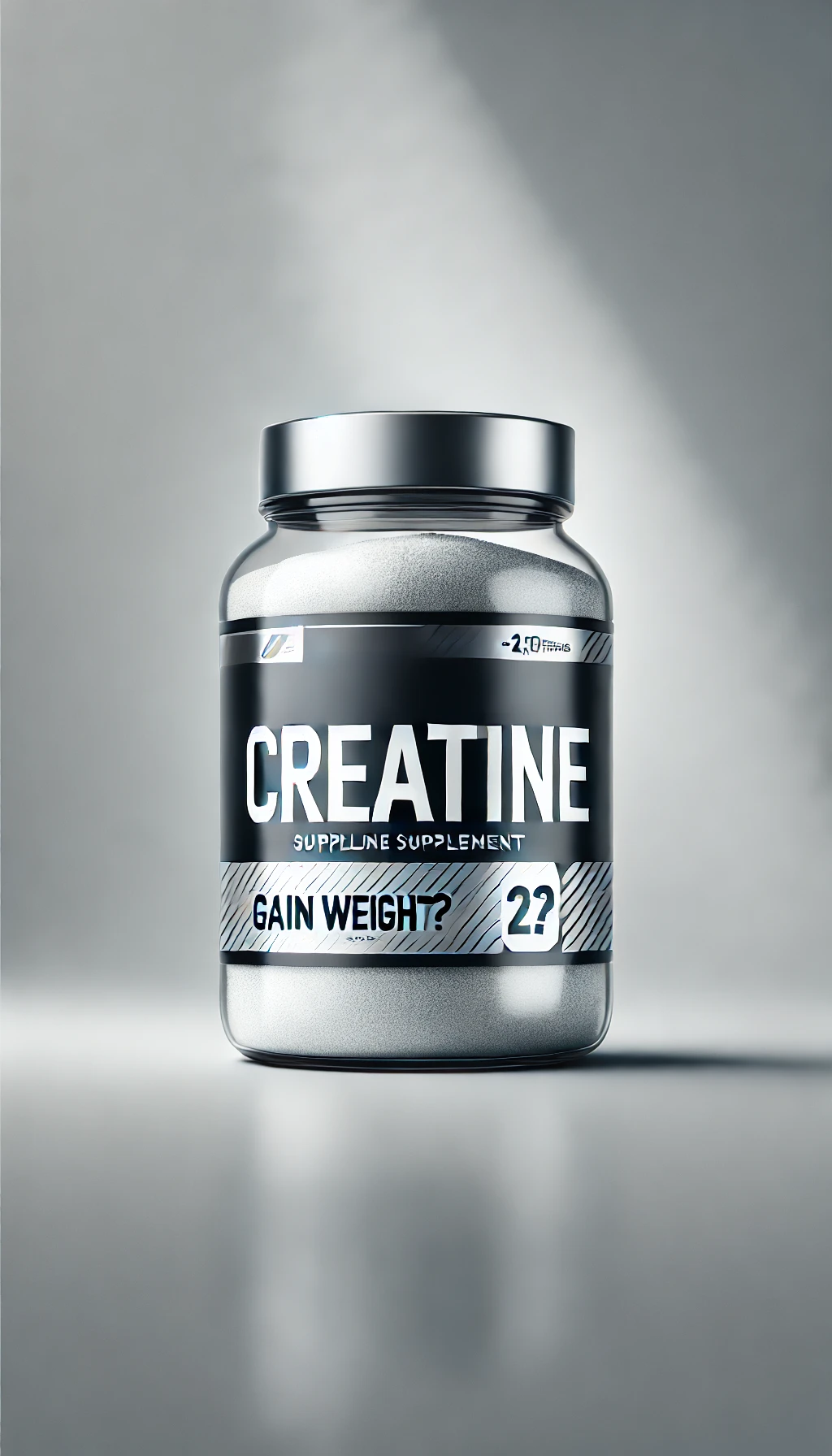Creatine is one of the most popular supplements in the fitness world, known for enhancing athletic performance and supporting muscle growth. However, many people wonder whether creatine causes weight gain and, if so, whether this is a good or bad thing. In this article, we’ll explore the science behind creatine, how it works, its benefits, and its effects on weight gain, muscle growth, and appearance. By the end, you’ll know if creatine is the right choice for you and how it can help you reach your fitness goals.
What is Creatine?
Creatine is a naturally occurring compound found mostly in muscle cells. It consists of three amino acids: arginine, glycine, and methionine. While the body produces creatine, you can also get it from foods like red meat and fish. Additionally, creatine is available as a supplement, most commonly in the form of creatine monohydrate, which has been extensively studied.
How Does Creatine Work?
Creatine plays a key role in producing adenosine triphosphate (ATP), the main energy source for cells. During high-intensity, short-duration activities like weightlifting or sprinting, your muscles need quick energy. Creatine helps regenerate ATP from adenosine diphosphate (ADP) faster, allowing your muscles to perform at high levels for longer periods.
In simple terms:
- Creatine stores phosphate groups that donate to ADP to regenerate ATP, providing rapid energy during intense exercise.
- Enhanced energy production allows for stronger and longer muscle contractions during short bursts of activity.
The Science Behind Creatine and Weight Gain
Many people worry about gaining weight with creatine use. The short answer is yes, creatine can cause weight gain, but it’s essential to understand why this happens. The type of weight gained with creatine is typically a positive outcome, especially for athletes and bodybuilders.
Types of Weight Gain from Creatine
- Water Retention
- Intramuscular Water: Creatine increases water content inside your muscle cells. This is different from subcutaneous water retention (under the skin), which can cause bloating.
- Visual Impact: More water in the muscles makes them look fuller and more muscular, which is often a desirable effect.
Lean Muscle Mass Gain
- Increases Training Capacity: By enabling harder and longer workouts, creatine indirectly supports muscle growth. More intense workouts lead to muscle fibers getting stronger and larger, adding to muscle mass.
- Boosts Muscle Protein Synthesis: Creatine can enhance muscle protein synthesis, leading to more lean muscle mass. This type of weight gain is healthy and improves both performance and appearance.

Why Creatine Weight Gain is Beneficial?
- Increased Muscle Volume: Water retention in muscles gives them a fuller, more defined look.
- Improved Performance: More muscle volume boosts strength and power output, enhancing performance in high-intensity exercises.
- Faster Recovery: Creatine use can reduce muscle soreness and speed up recovery, allowing for more frequent and effective training.
Benefits of Taking Creatine
Beyond the initial weight gain, creatine offers numerous benefits that make it popular among athletes and bodybuilders.
Enhanced Athletic Performance
- Increased Strength and Power: Many studies show that creatine significantly boosts strength, especially in short-duration, high-intensity exercises.
- Improved Sprint Performance: For short bursts of energy, like sprinting or high-intensity interval training (HIIT), creatine helps maintain peak performance longer.
Supports Muscle Growth
- Promotes Muscle Hypertrophy: Creatine increases water content in muscle cells and enhances protein synthesis, leading to muscle growth.
- Stimulates Satellite Cell Activity: These cells are essential for muscle repair and growth. Creatine boosts their activity, improving muscle regeneration.
Aids in Recovery
- Reduces Muscle Damage: Creatine can decrease muscle cell damage and inflammation after intense exercise, speeding up recovery and reducing soreness.
- Enhances Glycogen Replenishment: It helps replenish muscle glycogen stores faster after exercise, crucial for recovery and future performance.
Cognitive Benefits
- Improves Brain Function: Some research suggests creatine may enhance memory and reduce mental fatigue, as the brain also requires ATP.
- Potential Neuroprotective Effects: Studies suggest creatine might protect against conditions like Alzheimer’s and Parkinson’s disease.
Supports Overall Health
- May Improve Glucose Tolerance: Early studies indicate creatine might improve glucose tolerance and insulin sensitivity, beneficial for metabolic health.
- Supports Bone Health: By promoting muscle growth and strength, creatine helps maintain bone density, especially important as we age.

Creatine and Muscle Growth: How It Works
Creatine is well-known for boosting muscle growth, making it a favorite among bodybuilders and strength athletes. Here’s how creatine helps muscles grow and improve appearance.
Increases Training Volume and Intensity
- Higher Energy Availability: Creatine increases ATP, allowing heavier lifting and more reps. Over time, this leads to muscle growth.
- Delayed Fatigue: With creatine, muscles fatigue less quickly, enabling longer and more productive workouts.
Promotes Cellular Hydration
- Cell Volume: Creatine pulls water into muscle cells, creating a better environment for growth. Hydrated cells synthesize protein and repair muscle more effectively.
- Signals for Growth: Increased water acts as a growth signal, encouraging the production of proteins and other molecules needed for muscle growth.
Enhances Muscle Fiber Recruitment
- Increased Fiber Activation: Creatine boosts the activation of muscle fibers, especially the fast-twitch ones crucial for power and growth.
- Greater Muscle Activation: More activated fibers mean a more thorough workout, leading to better muscle gains.
Boosts Protein Synthesis
- Direct Impact on Muscle Proteins: Creatine directly enhances muscle protein synthesis, aiding in repair and growth after exercise.
- Reduces Protein Breakdown: Besides boosting synthesis, creatine also slows protein breakdown, promoting a favorable balance for muscle growth.
Understanding Positive Weight Gain from Creatine
When people hear “weight gain,” they often think of fat. However, the weight gained with creatine use is mainly lean muscle mass and water retention in muscle cells. This weight gain is beneficial for several reasons:
- Improves Body Composition: Gaining lean muscle mass improves overall body composition and physique.
- Enhances Aesthetics: More muscle volume results in a more muscular and defined look.
- Provides Functional Benefits: Increased muscle mass boosts functional strength, improving athletic performance and daily activities.

Misconceptions About Creatine and Weight Gain
Despite its benefits, misconceptions about creatine still exist, especially regarding its impact on weight and appearance.
- Myth: Creatine Causes Fat Gain: Creatine does not increase body fat. The weight gain is due to water retention in muscles and muscle growth, not fat.
- Myth: Creatine Causes Bloating: Some believe creatine causes bloating, but this is a misunderstanding. The increased water is in the muscles, not under the skin, leading to fuller, more defined muscles.
How to Use Creatine Effectively
To maximize creatine’s benefits and minimize any potential side effects, it’s essential to use it correctly.
Loading Phase vs. Maintenance Phase
- Loading Phase: Some start with a loading phase, taking a higher dose (20 grams per day) for 5-7 days to quickly saturate muscles with creatine.
- Maintenance Phase: After loading, a maintenance dose of 3-5 grams per day helps keep creatine levels high in the muscles.
Best Time to Take Creatine
- Pre-Workout or Post-Workout: You can take creatine before or after a workout. Some studies suggest that post-workout consumption might be better for muscle growth.
- Consistency Matters: The timing of creatine is less important than taking it consistently. Daily use ensures muscles remain saturated with creatine.
Stay Hydrated
- Drink Plenty of Water: Creatine draws water into muscles, so staying hydrated is crucial to avoid dehydration and maximize benefits.
So, does creatine make you gain weight? Yes, but this weight gain comes from increased water retention in muscles and lean muscle mass growth—both of which are positive outcomes. Creatine is a well-researched, safe, and effective supplement that boosts strength, enhances performance, supports muscle growth, and provides several health benefits.
If you’re looking to build muscle, improve performance, or achieve a more defined physique, creatine can help you reach your goals. As with any supplement, using creatine correctly, staying hydrated, and maintaining a balanced diet and exercise program are key to maximizing its benefits.
By understanding how creatine works and its effects on weight and muscle growth, you can make an informed decision about adding it to your fitness regimen. Remember, the weight gained from creatine is primarily muscle mass, which is exactly the kind of weight gain most fitness enthusiasts aim for.

